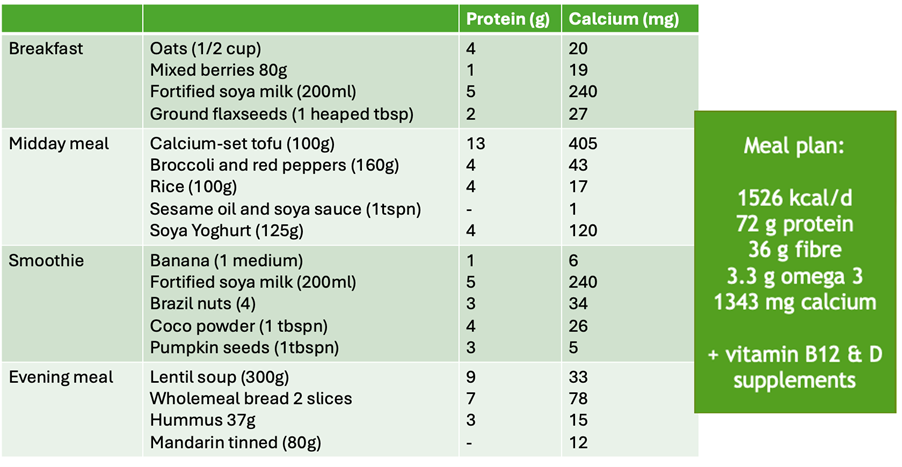Plant-based eating for older adults
By Sandra Hood, RD and Dr Shireen Kassam

As more people adopt a plant-based diet (PBD), it is important to consider the nutritional adequacy for older adults, especially since people over 65 years of age represent nearly 20% of the UK population 1. In healthcare settings, there remains scepticism around PBDs, and the belief that they are not suitable for older adults, especially for those with chronic conditions or for those at risk of sarcopenia or frailty.
Healthy ageing is sadly not the norm. Throughout the 20th century, life expectancy has increased to a median of 82.3 years for men and 85.8 years for women. However, since 2011 life expectancy has stalled and the State of Ageing report (2022) showed for the first time a reduction in life expectancy of 3 months for women and 4 months for men 2. It found the number of years we could expect to spend in good health without a disabling illness was also in decline, being approximately 62 years for men and 61 years for women. In addition, the Mortality & Life Expectancy Trends in the UK report (2019) uncovered a widening gap in life expectancy and avoidable deaths between the richest and poorest 3. No single cause or solution was suggested, instead it advised that as a society we needed to address diet, lifestyle and wider social determinants of health. Unfortunately the mention of food choices in general was sadly lacking.
There is substantial evidence that PBDs are associated with better health in older adults 4,5 with studies showing a lower incidence of chronic diseases including obesity 6 and hypertension 7, cardiovascular disease 8, cancer 9, type 2 diabetes 10, fatty liver disease 11,12, diverticular disease 13 and cataracts 14.
Concerns around protein adequacy and risk of sarcopenia and frailty also appear unfounded. Recent studies confirm that if sufficient protein is being consumed then plant sources of protein are associated with more favourable outcomes than animal sources 15–19. This is likely to be due to improvements in inflammation, metabolic health and benefits for the gut microbiome. There is also some evidence suggesting less medication use in older adults consuming a PBD 20.
Nutritional requirements in older adults
As we age, although the body has stopped growing, tissues continue to turn over and nutrient requirements generally stay the same. The Scientific Advisory Committee on Nutrition (SACN) demonstrated energy and macronutrient requirements are similar or unchanged throughout adult life 21. These dietary reference values (DRVs) are guides and energy and protein requirements will vary depending on activity levels and weight. It is important to remember that one size does not fit all and overall diet quality is generally more important than individual nutrients.
Protein intakes
One of the major threats to living independently in older people is sarcopenia. Older adults are less responsive to building up muscle compared to younger individuals, but this lack of responsiveness can be overcome with higher levels of protein consumption. Many older people often eat too little protein favouring carbohydrates and fats over healthy protein sources.
Current UK dietary recommendations for protein intake remain the same as for the younger adult at 0.75g/kg/day. However it is considered that the needs of older people may be as much as 25-50% higher due to protein being less efficiently utilised and to preserve muscle mass and strength. The European clinical guidelines recommend at least 1.0g/kg/day and during illness the European Society for Clinical Nutrition and Metabolism (ESPEN) recommend 1.2-1.5g/kg/day and up to 2.0g/kg/day in severe illness 22.
Studies have shown the protein intakes of PB eaters to be lower than the general population but still meeting requirements 23. There is evidence that older adults can protect and slow muscle loss through a combination of daily activity and extra protein. Increasing protein intake, regardless of dietary preference, should be encouraged as it is also important for bone health. Plant-based meat alternatives such as Quorn™, seitan and tofu are excellent sources of protein that can easily be incorporated into plant-based recipes.

Vitamin B12
Absorption of vitamin B12 from food may be compromised because of digestive changes as we age. The standard guidance for adults is to consume 1.5μg daily. For those on a PBD it is best to use a supplement of 50-100μg daily or a 2000μg weekly dose.
Vitamin D
Synthesis of vitamin D from sun exposure declines with ageing and many older people spend less time outside. This, together with decreased bone density, leads to a recommendation of a supplement of 10mcg/day (400IU). Some individuals may need higher doses including people with darker skin, those on certain medications and people carrying excess weight.
Calcium
The DRV for calcium for all adults, regardless of age, is 700mg/day. However, it may be prudent to aim for 1000-1200mg/day due to calcium absorption being less efficient as we age, together with decreased bone density. Studies have shown vegans consume less calcium than conventional eaters, but the higher calcium recommendations can easily be met by regular consumption of beans and low-oxalate greens, fortified dairy alternatives, calcium-set tofu and other calcium rich foods.
Omega-3 fatty acids
Long chain omega-3 fats from fish have shown benefits of long chain omega-3 fats for heart health and in protecting the ageing brain. However, to date, studies do not show any detrimental effects on brain health for those following a plant-based diet 25–27. The essential fatty acid, alpha-linolenic acid (ALA) converts to the long chain fatty acids EPA and DHA. However, conversion rates vary and may be less efficient as we age. There are no specific recommendations for the amounts of EPA and DHA for adults. To meet daily requirements of 2-4g of ALA per day, this would require a tablespoon of chia seeds or ground flaxseeds (linseeds), or two tablespoons of hemp seeds or six walnut halves daily. A reliable source of long chain omega-3 fats is a microalgae supplement with at least 250mg dosage of DHA for adults per day. Research on the benefits of omega-3 fatty acids for protecting cognitive health is controversial. What we do know is that a healthy lifestyle, consuming unprocessed whole foods, including plenty of fruit and vegetables maintains cognitive health and prevents dementia
Zinc
Zinc is a micronutrient that plays a key role in immune health. Good plant sources of zinc are beans, lentils, tofu, whole grains, wholemeal bread, nuts and seeds. The presence of inhibitors of absorption such as phytates also needs consideration. Soaking, fermenting and sprouting can significantly reduce phytate levels and aid absorption of zinc and other micronutrients such as iron.
Iodine
Iodine is a vital component of thyroid hormones. The adult recommendation is 140μg daily. Plant foods are typically low in iodine, but seaweed offers a rich source; 2 sheets of nori may meet daily needs. Beware of contaminated seaweeds like hijiki or excessively iodine-rich kelp. Salt is not iodised in the UK, but some plant milks are iodine fortified. Supplements are a practical choice for those on a plant-based diets.
Long term health of PB eaters
There are clearly documented long-term health benefits for people consuming a PBD. These include improved cardiometabolic health and a lower risk of heart disease and certain cancers. Some of these benefits are derived from the distinct microbiota of PB eaters with a greater abundance of protective species 28. Reduced levels of inflammation may be the key feature linking the gut microbiota with protective health effects 29.
The main concern around a PB diet is the potential increased risk of bone fracture 30,31. However, there is clear learning from these studies. Those at highest risk of fracture are women of lower BMI who are not consuming sufficient protein, calcium, vitamin B12 and D. Most fractures in older people are caused by the combination of osteopenia and a fall. We do know that PBDs are rich in nutrients such as antioxidants, which are bone protective and that a high-quality PBD along with other healthy lifestyle habits can support good bone health 32,33. Several studies have confirmed the benefits of consuming more fruit and vegetables for improving bone health 34.
Meeting nutritional requirements
Older adults can easily meet nutrient requirement on a PBD. Hospitalised patients with a poor appetite may need to optimise their diet with food fortification, high calorie foods and supplements, regardless of diet pattern. Tables 1 and 2 show a real example of a hospital menu and compares meals and food items with plant-based alternatives. Figure 1 provides an example meal plan.
Many of the food items that are commonly used to fortify the conventional diet can be replaced with vegan alternatives. PB eaters also have the added benefits of avoiding the saturated fat and nitrates found in animal foods and consuming higher levels of antioxidants found in plant foods. For those struggling to meet nutritional requirements, plant-based protein shakes and supplements are now available including nutritionally complete foods that can be provided on prescription.
Summary
- A varied and well balanced PB diet can meet the nutritional requirements of the older adult and can have numerous health benefits.
- A high-quality source of protein rich food should be provided at each meal.
- A healthy BMI and consistent muscle/strength building activity should be encouraged.
- A regular reliable source of vitamin B12 is essential, together with vitamin D and adequate calcium.
- One size does not fit all and eating pattern and overall diet is generally more important than individual nutrients.

Table 1: Typical hospital menu (modelled from an actual hospital, Feb 2024)
Approximate daily goal 2000 kcals, 700mg calcium, 50g protein
Scroll to see the full table →
| Non vegan (NV) | Vegan | Kcals (NV) | Kcals vegan | Protein (NV) | Protein vegan | Calcium (NV) | Calcium vegan |
| Porridge (160g) | Same | 135 | 135 | 7 | 7 | 187 | 187 |
| Orange juice (150ml) | Same | 51 | 51 | 0 | 0 | 18 | 18 |
| Beef bolognaise (75g meat) | Lentil bolognaise (75g lentils) | 157 | 75 | 16 | 6 | 15 | 12 |
| Pasta wholemeal 150g | Same | 201 | 201 | 8 | 8 | 47 | 47 |
| Wholemeal bread 2 x slices (36g/slice) | Same | 156 | 156 | 7 | 7 | 76 | 76 |
| Egg (50g)
Tomato |
Hummus (40g)
Tomato |
71
12 |
123
12 |
7
0 |
3
0 |
27
7 |
16
7 |
| Broccoli 85g medium portion steamed | Same | 29 | 29 | 4 | 4 | 37 | 37 |
| Butter 14g (average spreading on 2 slices of bread) | Vegan butter | 104 | 100 | 0 | 0 | 0 | 0 |
| Semi skim milk 100ml (approx. in 3 hot drinks) | Unsweetened soya | 46 | 26 | 3 | 3 | 120 | 120 |
| Dairy full fat yoghurt 150g (but many NHS yogurts are low calorie) |
Fortified soya or coconut yoghurt 150g | 164 | 108 | 6 | 5 | 183 | 180 |
| Fruit cake (45g) | Same | 150 | 150 | 2 | 2 | 33 | 33 |
| TOTAL | 1276 | 1166 | 60 | 45 | 750 | 733 |
Table 2. Comparisons of other foods typical on a hospital menu
| Non vegan (NV) | Vegan | Kcals (NV) | Kcals vegan | Protein (NV) | Protein vegan | Calcium (NV) | Calcium vegan |
| Ham slice (35 g) | Quorn ham slice (35g) | 38 | 43 | 6 | 6 | 2 | Not listed (N/L) |
| Veg & lentil soup (245g) | Same | 150 | 150 | 9 | 9 | 40 | 40 |
| Dairy ice cream tub (60g) | Non-dairy ice cream portion (60g) | 101 | 104 | 2 | 0 | 62 | N/L |
| Philly original (50g) | Philly PB cream cheese | 226 | 217 | 5 | 3 | 49 | N/L |
| Cheese & onion quiche (100g) | Vegan soya quiche (100g) | 260 | 243 | 10 | 7 | N/L | N/L |
| Pukka Steak & kidney pie & gravy (219g) | Pukka no steak pie (216g) | 481 | 504 | 14 | 16 | N/L | N/L |
| TOTAL | 1256 | 1261 | 46 | 41 | NA | NA |
Figure 1: Example meal plan for older adults by Beth Rougier, RD and V for Life

References
- UK Government. Office of National Statistics Census.; 2021. https://www.ons.gov.uk/census.
- Centre for Ageing Better. The State of Ageing.; 2022. https://ageing-better.org.uk/state-of-ageing.
- The Health Foundation. Mortality and Life Expectancy Trends in the UK.; 2019. https://www.health.org.uk/publications/reports/mortality-and-life-expectancy-trends-in-the-uk.
- Wang P, Song M, Eliassen AH, et al. Optimal dietary patterns for prevention of chronic disease. Nat Med. 2023;29(3). doi:10.1038/s41591-023-02235-5
- Thompson AS, Tresserra-Rimbau A, Karavasiloglou N, et al. Association of Healthful Plant-based Diet Adherence with Risk of Mortality and Major Chronic Diseases among Adults in the UK. JAMA Netw Open. 2023;6(3). doi:10.1001/jamanetworkopen.2023.4714
- Jarvis SE, Nguyen M, Malik VS. Association between adherence to plant-based dietary patterns and obesity risk: a systematic review of prospective cohort studies. Appl Physiol Nutr Metab. 2022;47(12):1115-1133. doi:10.1139/apnm-2022-0059
- Gibbs J, Gaskin E, Ji C, Miller MA, Cappuccio FP. The effect of plant-based dietary patterns on blood pressure: a systematic review and meta-analysis of controlled intervention trials. J Hypertens. 2021;39(1). doi:10.1097/HJH.0000000000002604
- Dybvik JS, Svendsen M, Aune D. Vegetarian and vegan diets and the risk of cardiovascular disease, ischemic heart disease and stroke: a systematic review and meta-analysis of prospective cohort studies. Eur J Nutr. 2023;62(1):51-69. doi:10.1007/s00394-022-02942-8
- Orlich MJ, Chiu THT, Dhillon PK, et al. Vegetarian Epidemiology: Review and Discussion of Findings from Geographically Diverse Cohorts. Adv Nutr. 2019. doi:10.1093/advances/nmy109
- Satija A, Bhupathiraju SN, Rimm EB, et al. Plant-Based Dietary Patterns and Incidence of Type 2 Diabetes in US Men and Women: Results from Three Prospective Cohort Studies. PLoS Med. 2016. doi:10.1371/journal.pmed.1002039
- Chiu TH, Lin MN, Pan WH, Chen YC, Lin CL. Vegetarian diet, food substitution, and nonalcoholic fatty liver. Tzu Chi Med J. 2018;30(2). doi:10.4103/tcmj.tcmj_109_17
- Lv Y, Rong S, Deng Y, Bao W, Xia Y, Chen L. Plant-based diets, genetic predisposition and risk of non-alcoholic fatty liver disease. BMC Med. 2023;21(1). doi:10.1186/s12916-023-03028-w
- Crowe FL, Appleby PN, Allen NE, Key TJ. Diet and risk of diverticular disease in Oxford cohort of European Prospective Investigation into Cancer and Nutrition (EPIC): Prospective study of British vegetarians and non-vegetarians. BMJ. 2011. doi:10.1136/bmj.d4131
- Chiu THT, Chang CC, Lin CL, Lin MN. A Vegetarian Diet Is Associated with a Lower Risk of Cataract, Particularly Among Individuals with Overweight: A Prospective Study. J Acad Nutr Diet. 2020. doi:10.1016/j.jand.2020.11.003
- Maroto-Rodriguez J, Delgado-Velandia M, Ortolá R, et al. Plant-based diets and risk of frailty in community-dwelling older adults: the Seniors-ENRICA-1 cohort. GeroScience. 2023;45(1). doi:10.1007/s11357-022-00614-3
- Sotos-Prieto M, Struijk EA, Fung TT, et al. Association between the quality of plant-based diets and risk of frailty. J Cachexia Sarcopenia Muscle. 2022;13(6). doi:10.1002/jcsm.13077
- Struijk EA, Fung TT, Rodríguez-Artalejo F, et al. Protein intake and risk of frailty among older women in the Nurses’ Health Study. J Cachexia Sarcopenia Muscle. 2022;13(3). doi:10.1002/jcsm.12972
- Ardisson Korat A V, Shea MK, Jacques PF, et al. Dietary protein intake in midlife in relation to healthy aging – results from the prospective Nurses’ Health Study cohort. Am J Clin Nutr. 2024;119(2):271-282. doi:https://doi.org/10.1016/j.ajcnut.2023.11.010
- Carballo-Casla A, Sotos-Prieto M, García-Esquinas E, et al. Animal and vegetable protein intake and malnutrition in older adults: a multicohort study. J Nutr Heal aging. 2024;28(1):100002. doi:https://doi.org/10.1016/j.jnha.2023.100002
- Dos Santos H, Gaio J, Durisic A, Beeson WL, Alabadi A. The Polypharma Study: Association Between Diet and Amount of Prescription Drugs Among Seniors. Am J Lifestyle Med. 2021. doi:10.1177/15598276211048812
- Public Health England. Government Dietary Recommendations: Government Recommendations for Energy and Nutrients for Males and Females Aged 1 – 18 Years and 19+ Years.; 2016.
- Volkert D, Beck AM, Cederholm T, et al. ESPEN guideline on clinical nutrition and hydration in geriatrics. Clin Nutr. 2019. doi:10.1016/j.clnu.2018.05.024
- Davey GK, Spencer EA, Appleby PN, Allen NE, Knox KH, Key TJ. EPIC–Oxford:lifestyle characteristics and nutrient intakes in a cohort of 33 883 meat-eaters and 31 546 non meat-eaters in the UK. Public Health Nutr. 2003. doi:10.1079/phn2002430
- Sherzai AZ, Sherzai AN, Sherzai D. A Systematic Review of Omega-3 Consumption and Neuroprotective Cognitive Outcomes. Am J Lifestyle Med. 2023;17(4). doi:10.1177/15598276221117102
- Giem P, Beeson WL, Fraser GE. The incidence of dementia and intake of animal products: Preliminary findings from the Adventist Health Study. Neuroepidemiology. 1993. doi:10.1159/000110296
- Tsai JH, Huang CF, Lin MN, Chang CE, Chang CC, Lin CL. Taiwanese Vegetarians Are Associated with Lower Dementia Risk: A Prospective Cohort Study. Nutrients. 2022;14(3). doi:10.3390/nu14030588
- Ramey MM, Shields GS, Yonelinas AP. Markers of a plant-based diet relate to memory and executive function in older adults. Nutr Neurosci. 2020. doi:10.1080/1028415X.2020.1751506
- Tomova A, Bukovsky I, Rembert E, et al. The Effects of Vegetarian and Vegan Diets on Gut Microbiota . Front Nutr . 2019;6:47. https://www.frontiersin.org/articles/10.3389/fnut.2019.00047.
- Craddock JC, Neale EP, Peoples GE, Probst YC. Vegetarian-Based Dietary Patterns and their Relation with Inflammatory and Immune Biomarkers: A Systematic Review and Meta-Analysis. Adv Nutr. 2019;10(3). doi:10.1093/advances/nmy103
- Tong TYN, Appleby PN, Armstrong MEG, et al. Vegetarian and vegan diets and risks of total and site-specific fractures: results from the prospective EPIC-Oxford study. BMC Med. 2020. doi:10.1186/s12916-020-01815-3
- Thorpe DL, Beeson WL, Knutsen R, Fraser GE, Knutsen SF. Dietary patterns and hip fracture in the Adventist Health Study 2: combined vitamin D and calcium supplementation mitigate increased hip fracture risk among vegans. Am J Clin Nutr. 2021. doi:10.1093/ajcn/nqab095
- Zheng Y, Wang J, Li Y, Xu K, Chen X. Bone health and high-quality of diet: Unveiling the combined effect of plant-based diet and bone mineral density on all-cause mortality. J Funct Foods. 2023;111:105904. doi:https://doi.org/10.1016/j.jff.2023.105904
- Sotos-Prieto M, Rodriguez-Artalejo F, Fung TT, et al. Plant-Based Diets and Risk of Hip Fracture in Postmenopausal Women. JAMA Netw Open. 2024;7(2):e241107-e241107. doi:10.1001/jamanetworkopen.2024.1107
- Brondani JE, Comim F V., Flores LM, Martini LA, Premaor MO. Fruit and vegetable intake and bones: A systematic review and meta-analysis. PLoS One. 2019. doi:10.1371/journal.pone.0217223
